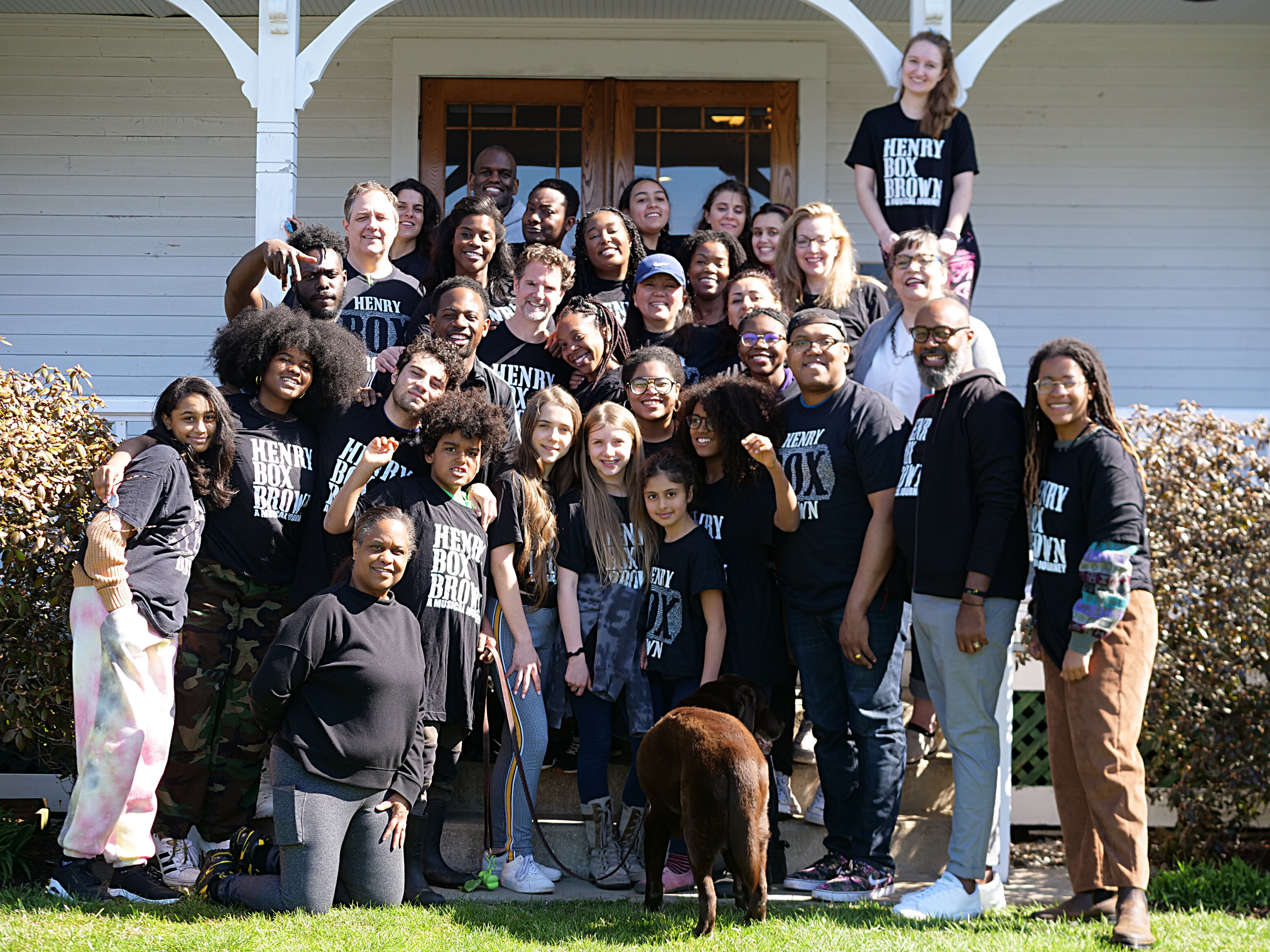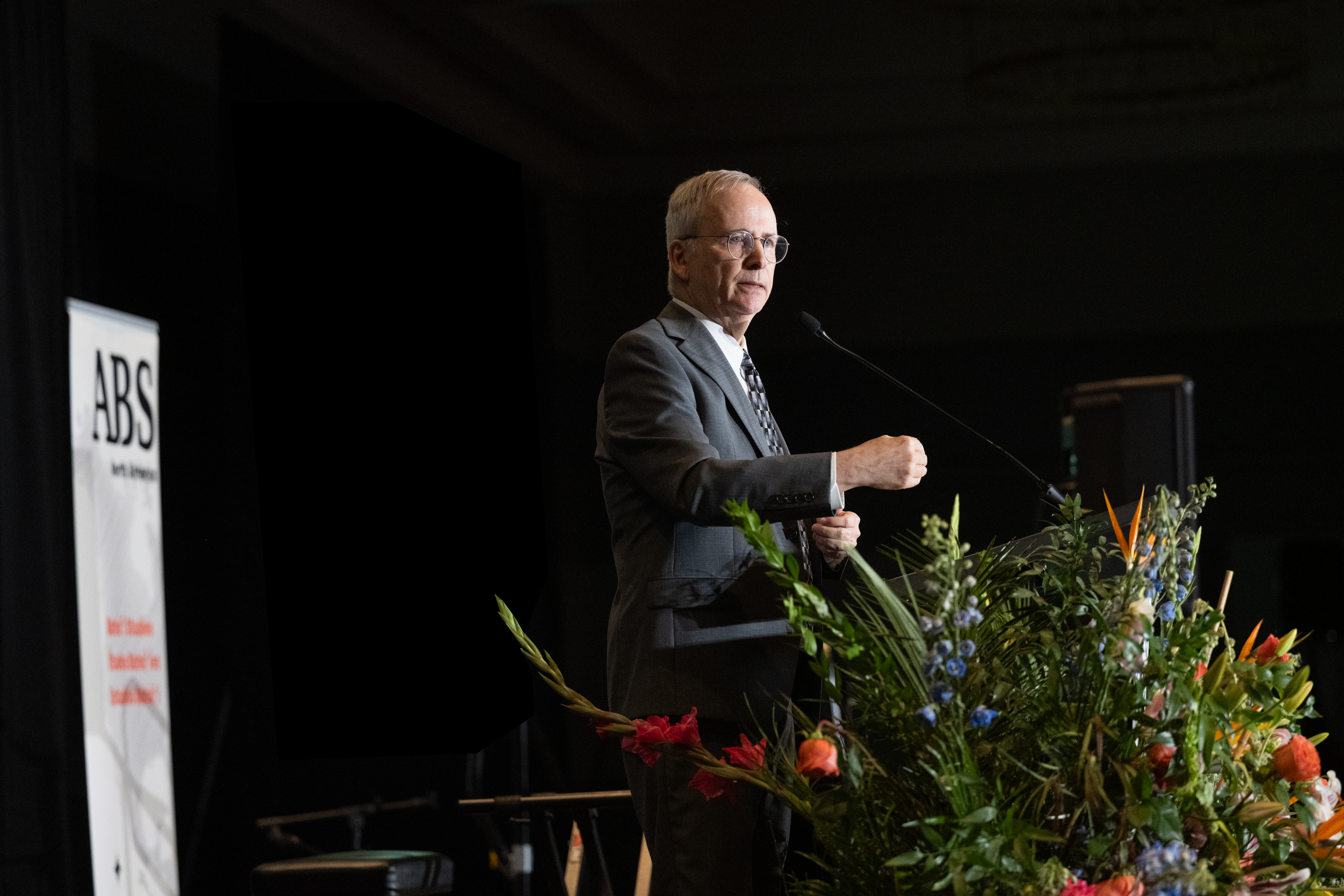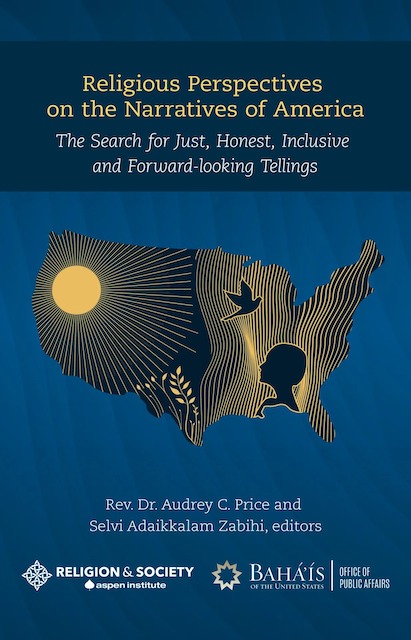
Economy, law and governance
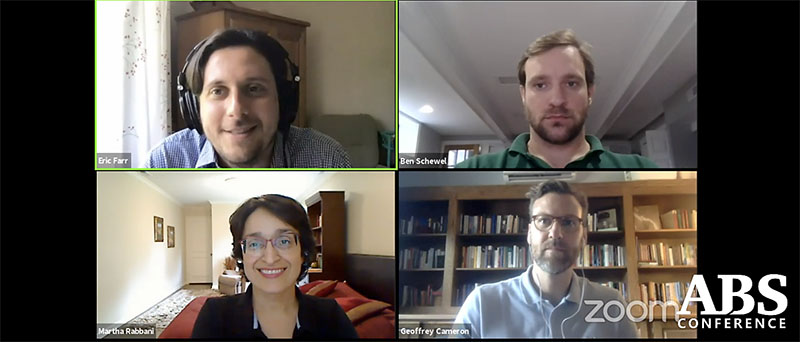
The intersection of economic systems and legal governance proved a fruitful topic for several sessions at the 2020 conference of the Association for Baha’i Studies. A few examples:
Roundtable: Exploring new models of corporate responsibility, Aug. 8

Corporate social responsibility is a movement that attempts to reconcile profit with social and environmental concerns. But as currently used, the concept “lacks precision,” and efforts in that name could be no more than a marketing tool, said Nabil Elias, business professor emeritus for the University of North Carolina at Charlotte.
He and two other scholars looked at how ideas contributed from Bahá’í perspectives could help corporations value social benefit as much as profit.
The Universal House of Justice, global governing council of the Baha’i Faith, has stated, “Economic life is an arena for the expression of honesty, integrity, trustworthiness, generosity, and other qualities of the spirit. The individual is not merely a self-interested economic unit. …” Elias noted how this contrasts with prevailing economics theory that sees people as “predominantly self-interested, insatiable consumers.”
Over four decades, Elias noted, corporate social responsibility has gained traction as a way for business to measure its success by “a triple bottom line” of profit, people and environment. However, many think it fails under the weight of laws and habits that favor shareholder profits over all other stakeholders and that continue to concentrate wealth into a few hands.
Some alternative structures such as benefit corporations, and processes such as stakeholder capitalism, have generated valuable learning. But they seem dwarfed by corporate power in a world where “Of the largest 100 economies in the world, 69 of those are corporations; 31 are countries.”
Baha’is can and must play a role in helping the business world evolve toward moral excellence, Elias said. Possibilities he suggested:
- Carefully studying how unity, justice, nobility and sustainability can be applied in a business context.
- Developing the capacity to apply consultation, collaboration and accompaniment.
- Engaging in discourses related to moral excellence.
- Learning from people who have striven to apply spiritual values in their work.
Jean Parker, a faculty member for the Global Nonprofit Leadership Program at Regis University in Colorado, pondered the imbalance of power between for-profit companies and the nonprofit corporations that often rely on their charitable giving.
The two sectors generally have different values and aims. Most nonprofits aim to take specific actions for the betterment of society. In contrast, businesses often follow their own interests in spending for charity and their priorities can change abruptly. Sometimes their products conflict with a nonprofit’s mission; she mentioned a crime victims’ support organization refusing a contribution offered by a beer company after volunteers threatened to quit.
Such differences of purpose, Parker said, lead to situations such as “$1.2 trillion sitting in U.S. private foundations … that is not moving into the nonprofit sector.” Those differences can also reflect class, race and culture distinctions between people who gravitate to the for-profit versus nonprofit sectors.
One way to meet these challenges could be to “foster collaborations that are relational rather than transactional,” she said. With such an orientation, “all parties view collaboration as necessary to the end goal.”
Sadly, the world is vulnerable to a distorted view of the purpose of wealth, said Emily Chew, a sustainability investment executive. She cited Baha’i teachings pointing to the principle that “Wealth is there to serve humanity, not an object in and of itself.”
World economic forums are recognizing the risks of a purely competitive quest for wealth. In the absence of a coherent global approach, resource exploitation is hastening climate change, and the cheapening of labor worldwide worsens inequities in a way that “undermines growth and efficiency in the longer term.”
The idea of “stakeholder capitalism” is emerging from the recognition of these and other hazards. The idea is to change the purpose of corporations to acknowledge their relationship with society in general, in a way that one scholar says can “drive the next wave of innovation, productivity, growth for the economy.”
Though shareholders often resist this evolution of thought, Chew mentioned several influential international position statements. Some investor coalitions are following up on these ideas, with an eye toward reducing the risks that climate change poses for business assets. “This is providing some of the moral leadership needed,” she said.
Baha’is have a role not only in contributing ideas to initiatives already under way, but also in developing original bodies of thought. She pointed to research by fellow ABS presenter Michael Karlberg that reveals the limitations of competition and builds a case for developing “a culture of mutualism, and ideally of mutual empowerment over time.”
Globalization and Justice: Insights from the ABS Reading Groups, Aug. 6
Even though the process may seem slow and intermittent, greater unity on the global level shows promise in opening the road to a wider sense of justice, two reading groups are discovering.
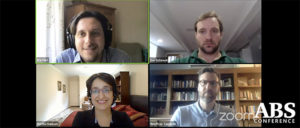
A group making “Inquiries into World Order” is focusing at first on the process of organizing the United Nations after World War II, “the most meaningful steps humanity has taken to end warfare,” noted Geoffrey Cameron, director of public affairs for Canada’s national Baha’i community.
Through the lens of Bahá’í perspectives on the historical march toward global peace — including The World Order of Baha’u’llah and Century of Light — the group is looking into works by cultural scholars Mark Mazower, Mark Greif and others. They shed light on a “building discourse around very lofty ideas” in the Western world in the 1930s and 1940s, which built the foundation for a new level of world cooperation. Even so, the UN is structured in a way that hasn’t overcome the “fetish of national sovereignty.”
Benjamin Schewel, a Netherlands-based philosopher and affiliate scholar at the University of Virginia, added that the group’s reading is helping to clarify a “massive, fundamental transition in the structure of human affairs” that in the 20th century largely removed the reins of power from monarchs and religious leaders.
For a second group focusing on “Justice in the Age of Globalization,” Martha Jalali Rabbani, a lecturer at the University of Kansas, talked about reading of works by such critical theorists as Germany’s Axel Honneth and Jürgen Habermas. They argue that societies change “not through a struggle for self-preservation, but through moral impulses, through a moral drive within human beings that then materializes itself in … a different social, political and economic order.”
The emergence of the modern nation-state has been such a change, she said, creating frameworks — perhaps imperfect ones — for societies based on justice rather than the dominion of rulers. But globalization of the economy has weakened the power of nations to guarantee the rights of their citizens.
“We have to have some global governance if we want to rescue the project of freedom,” she said, echoing principles that are fundamental to Baha’i social teachings. The group’s reading suggests that the work of nations toward global institutions for justice has faltered, and to build the most secure foundation, “representatives of the citizens of the world” must join representatives of national governments in writing the charters.
Law and Economy: Insights from the ABS Reading Groups, Aug. 4
American economics, jurisprudence and law enforcement are all ripe for ideas that emphasize the spiritual nature of human beings and their inclination to learn. And reading groups on those three topics are at varied stages in bringing thoughts from the teachings of Baha’u’llah into those areas.
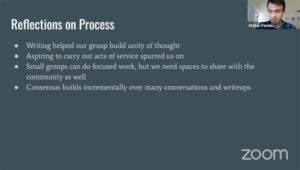
One group, “Questioning Econ 101,” has spent two years examining a basic theme of economics education: that people respond to incentives. In light of Baha’i teachings, the question arose: “Does that represent a distorted view of human nature?” noted Stefan Faridani, a University of California graduate student, and Selvi Zabihi, a university educator in Washington state.
Through consultation and review, the group drafted an analysis, looking at such questions as how economic systems can be viewed in ways other than capitalism vs. state control. The consultation is as crucial as the results, the presenters said; “It’s that process that builds shared understanding.”
 The reading group on jurisprudence has been studying predominant theories and philosophies shaping our legal system and analyzing the underlying assumptions that went into forming them, looking for insights into “the purpose of law in human society,” according to legal professionals Zalman Stern-Sapad and Shirin Ahlhauser. The group plans to generate its own analysis document with influence from Baha’i teachings on law and human nature.
The reading group on jurisprudence has been studying predominant theories and philosophies shaping our legal system and analyzing the underlying assumptions that went into forming them, looking for insights into “the purpose of law in human society,” according to legal professionals Zalman Stern-Sapad and Shirin Ahlhauser. The group plans to generate its own analysis document with influence from Baha’i teachings on law and human nature.
 The reading group on law enforcement is learning “how to engage in difficult conversations in a way that uplifts and explores” rather than sparking conflict, said Tschika McBean, human rights officer for the U.S. Baha’i Office of Public Affairs. The group is reading into such dimensions as the historical influence of slavery on the priorities of policing, as well as society’s “commodification of Black people.”
The reading group on law enforcement is learning “how to engage in difficult conversations in a way that uplifts and explores” rather than sparking conflict, said Tschika McBean, human rights officer for the U.S. Baha’i Office of Public Affairs. The group is reading into such dimensions as the historical influence of slavery on the priorities of policing, as well as society’s “commodification of Black people.”
 Another dimension is that there is general agreement that low-income urban communities need to be safer. But people have differing perspectives on whether the current system of policing is in fact making things safer, as well as the question “what does true safety mean?” noted Camilla Brown, another group member.
Another dimension is that there is general agreement that low-income urban communities need to be safer. But people have differing perspectives on whether the current system of policing is in fact making things safer, as well as the question “what does true safety mean?” noted Camilla Brown, another group member.
Baha’i values that nourish this reading and discussion include the oneness of humanity, nobility, a posture of learning, and how individuals, communities and institutions can support each other in that learning, said Sheida Rezapour, a U.S. federal general counsel.


